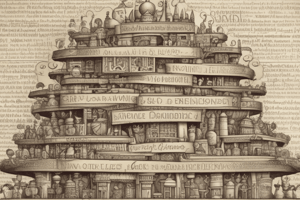Podcast
Questions and Answers
What is the main purpose of a Narrative Paragraph?
What is the main purpose of a Narrative Paragraph?
- To explain a process or concept
- To persuade the reader
- To tell a story (correct)
- To describe something vividly
A persuasive paragraph aims to explain a process or concept.
A persuasive paragraph aims to explain a process or concept.
False (B)
What are the two sources of data in a scientific paper?
What are the two sources of data in a scientific paper?
Primary (directly from the field) and secondary (from literature sources)
A Deductive-Inductive Paragraph has a topic sentence at the _______________ and end.
A Deductive-Inductive Paragraph has a topic sentence at the _______________ and end.
What is the main purpose of an Expository Paragraph?
What is the main purpose of an Expository Paragraph?
Match the following paragraph types with their descriptions:
Match the following paragraph types with their descriptions:
A scientific essay presents a problem based on empirical and subjective data.
A scientific essay presents a problem based on empirical and subjective data.
A paper in the context of scientific essays refers to a scientific paper that presents a problem based on empirical and objective ________________________.
A paper in the context of scientific essays refers to a scientific paper that presents a problem based on empirical and objective ________________________.
What is one of the characteristics of an effective sentence in terms of parallelism?
What is one of the characteristics of an effective sentence in terms of parallelism?
A good paragraph typically has only one or two sentences.
A good paragraph typically has only one or two sentences.
An effective sentence should avoid ______ conjunctions.
An effective sentence should avoid ______ conjunctions.
What is the main purpose of an argumentative essay?
What is the main purpose of an argumentative essay?
Match the following essay models with their descriptions:
Match the following essay models with their descriptions:
What is the main requirement for a good paragraph in terms of unity?
What is the main requirement for a good paragraph in terms of unity?
A sentence with redundancy or repetition is an effective sentence.
A sentence with redundancy or repetition is an effective sentence.
What is the purpose of paragraphs in writing?
What is the purpose of paragraphs in writing?
Flashcards are hidden until you start studying
Study Notes
Effective Sentences
- Equivalence: balance between thoughts and language structure, characterized by clear subject and predicate, no redundancy or repetition, avoidance of unnecessary conjunctions, and correct use of predicates.
- Parallelism: consistency in word forms used within a sentence, with similar structures for nouns and verbs.
- Assertiveness: emphasis on the main idea through highlighting important words at the beginning, creating a sequence of words, using contrast to highlight ideas, and applying emphasis particles.
- Frugality: avoidance of unnecessary words or phrases, including repetition of the subject, synonyms within the same sentence, and redundant plural words.
- Accuracy: precise word choice to avoid ambiguity or misunderstanding.
- Cohesion: clear and complete statements without fragmentation, avoiding long-winded sentences and unnecessary words that disrupt clarity.
- Logic: ensuring the sentence's idea is sensible and follows spelling rules.
Paragraphs
- A paragraph is a set of sentences supporting one main idea.
- Good paragraphs typically have more than one or two sentences, especially in expository and argumentative essays.
- Essay models include narrative, persuasion, description, exposition, and argumentative.
- Good paragraph requirements:
- Unity: focus on one main idea.
- Cohesion: logical and systematic relationship between sentences.
- Completeness: sufficient supporting sentences for the main idea.
Types of Paragraphs
- By sequence: opening, content, and concluding paragraphs.
- By topic sentence position: deductive, inductive, and deductive-inductive paragraphs.
- By content (essay model): narrative, persuasive, descriptive, expository, and argumentative paragraphs.
Paragraph Development Patterns
- Opposition patterns: contrast sentences to clarify points.
- Natural patterns: follow chronological or spatial order.
- Example giving patterns: use concrete examples to clarify.
- Classification patterns: group information logically.
- Causal patterns: show cause and effect relationships.
- Climax and anticlimactic patterns: build up to a climax or start with the main idea and support it with details.
Writing Scientific Essays
- Involves various aspects, including types of scientific essays, benefits of preparing scientific essays, scientific attitudes, citations, footnotes, bibliographies, and the use of language.
- Types of scientific essays: paper, paperwork, research report, and others.
- Papers can be primary (from the field) or secondary (from literature sources).
Studying That Suits You
Use AI to generate personalized quizzes and flashcards to suit your learning preferences.




